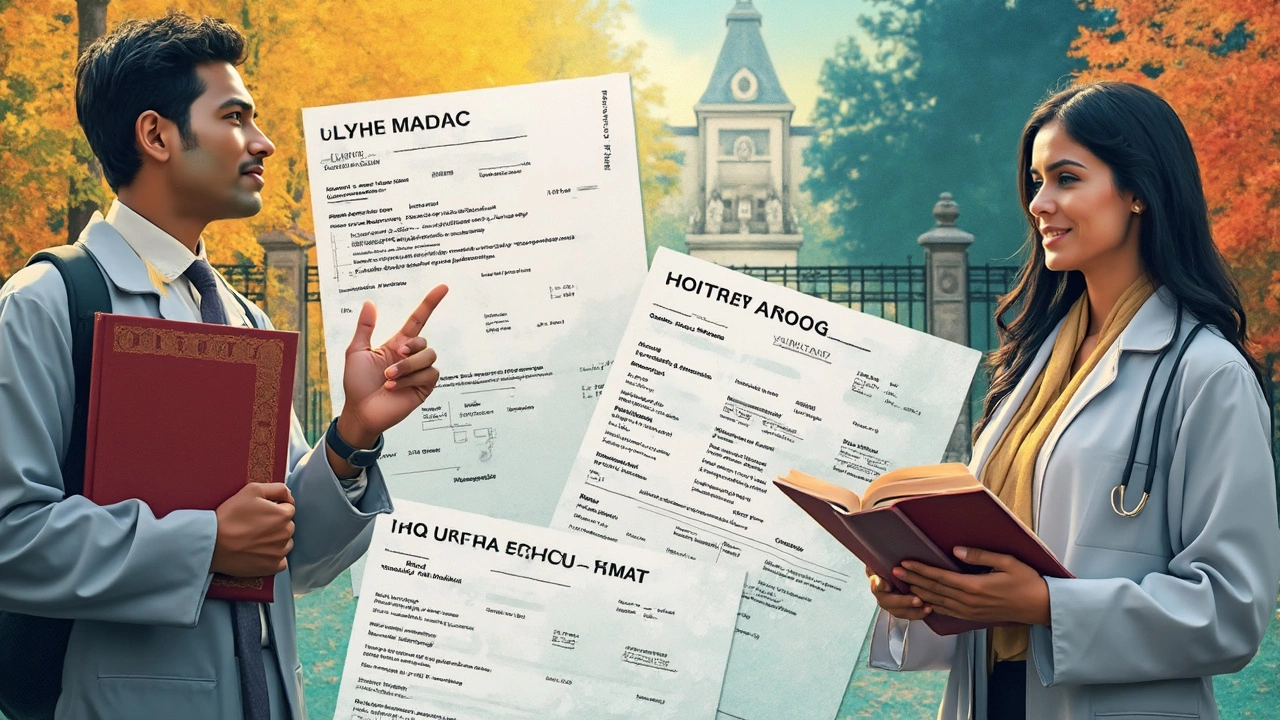
What MCAT Score Do I Need for Harvard?
If you’re aiming for Harvard Medical School, you probably already know you’ll need an outstanding MCAT score. Here’s the raw truth: the median MCAT for Harvard’s entering class in 2024 was 522 out of 528. That’s not just high, it’s sky-high—roughly the 99th percentile nationwide. If your first reaction is a mix of awe and panic, you’re not alone.
But here’s the catch: Harvard doesn’t have an official MCAT cutoff. Technically, you could apply with a lower score, but let’s be real—most accepted students are clustered around that 521-523 mark. A few get in with scores as “low” as 508-510, but odds get slimmer without something seriously impressive in other parts of your application.
So, ask yourself: is your MCAT number up there with the best? If not, should you take it again? Don’t forget, Harvard looks at more than just scores. But the bar is high—almost nobody sneaks in with an average number, unless their story or achievements truly blow the doors off the rest of the applicant pool.
- Harvard’s Typical MCAT Range
- How MCAT Scores Fit into the Application
- Other Important Admission Factors
- Tips to Improve Your Chances
- Common Myths About Harvard Med Admissions
Harvard’s Typical MCAT Range
When we’re talking about getting into Harvard for med school, it’s not enough to just be above average on your MCAT. Over the past few years, the accepted class usually falls within a narrow—and seriously competitive—range. For the 2024 entering class, most accepted students had scores between 520 and 525. The median score sits right at 522, which is pretty much the 99th percentile.
Here’s a quick look at the breakdown for Harvard’s recently accepted class:
| MCAT Score | Percentile | Commonality |
|---|---|---|
| 527-528 | 100th | Rare, but possible |
| 524-526 | 99th+ | Not uncommon for top applicants |
| 520-523 | 98th-99th | Majority of admits |
| 515-519 | 95th-97th | Admits need strong stories/achievements |
| Below 515 | Below 95th | Very few, must be exceptional otherwise |
So, if your MCAT is in the 520s, you’re hitting the sweet spot where most Harvard admits land. If you’re above 523, you’re flexing real test-taking muscle. Below 520? You’re not out, but you’ll need other parts of your application—like research, leadership, or unique experiences—to really stand out.
One more thing: Harvard doesn’t set a public cutoff, but just checking the data, very few folks get accepted under 515, and most of them have something truly outstanding somewhere else on their resume.
Bottom line: If you want your MCAT to look competitive for Harvard, shoot for the 98th percentile or better. It’s tough, but it gives your application some serious weight in the pile.
How MCAT Scores Fit into the Application
Your MCAT score is always going to be front and center when you apply to a place like Harvard. It’s usually the first thing people see on your application, even before they check your grades or essays. Schools like Harvard use the MCAT to quickly sort the massive stack of applications. Basically, if your score isn’t right up there with the top group, you’ll probably get cut early unless you have something else that really stands out.
Harvard averages are no joke. According to their 2024 admissions data, accepted students usually land between 520 and 526. If you’re above 520, you’re in the competitive range. Anything in the 510s is risky—most folks in that range end up at other (still great) med schools.
| MCAT Section | Median Score (2024) |
|---|---|
| Chem/Phys | 131 |
| CARS | 130 |
| Bio/Biochem | 131 |
| Psyc/Soc | 130 |
But here’s some good news—Harvard has a holistic review process. What does that mean? If your test scores and GPA are both solid, you’re through the first filter, but then your research, volunteering, recommendations, and story all get weighed in. If you’ve cured a major disease or started a life-saving non-profit, a slightly lower score could slide. For everyone else, the closer you are to the median, the better.
The MCAT is a key number, but it’s not the only one Harvard cares about. You’ll need to nail every piece of your application, but don’t let anyone tell you the score doesn’t matter. It matters—a lot.

Other Important Admission Factors
Getting a killer MCAT score is huge, but it won’t get you into Harvard Medical School alone. Harvard actually cares a ton about what’s beyond the numbers. If you’re only focusing on your test score, you’re missing half the game.
First up, GPA matters—a lot. For the class entering in 2024, the median GPA was 3.94. That’s almost straight A’s. They don’t say “no” if you have a B or two, but low grades make it an uphill battle. Harvard looks for trends too. If your grades started rough but shot up, that’s way better than a random mix.
Don’t forget about clinical experience. Harvard wants to see you actually know what “medicine” feels like in real life. Volunteering at hospitals, shadowing doctors, and working with patients goes a long way. The key is not just ticking boxes, but showing you’ve spent quality time in real healthcare settings.
Research is another big deal. Harvard’s a research powerhouse, so they love applicants who’ve spent time in labs or published in medical journals. You don’t need a Nobel Prize, but working on a real project and being able to explain what you learned can tip things in your favor.
Community service is huge, too. They want folks who give back, not just to pad a resume, but in ways that matter. Maybe you volunteered at a local clinic, tutored underrepresented kids, or started a public health group. It’s about showing heart and commitment over time—not just one-off stuff.
Leadership counts—you don’t have to be the president of every club, but taking initiative stands out. Maybe you led a campus health drive, founded an org, or took charge in research teams. If you can prove you left somewhere better than you found it, that’s gold.
- Strong letters of recommendation from science faculty or professionals who know you well can really boost your app.
- Your personal statement should actually say something unique, not just repeat your resume. Use it to explain why medicine—and why you’ll add something special to the next Harvard class.
- Harvard will look at your AMCAS application as a whole, not just fragments. Consistency across everything is key.
Interviews matter, too. They want genuine, communicative people—so being awkward or rehearsed isn’t going to help. Practice with a friend, but don’t script it. Show real passion for helping others and curiosity for medicine.
If you’re curious about the numbers, here’s a look at the 2024 admitted class:
| Median GPA | Median MCAT | Percent with Research | Percent with Clinical Volunteer Work |
|---|---|---|---|
| 3.94 | 522 | 99% | 98% |
So, yes, a bomb MCAT and high grades matter—but the rest of your story needs to show you actually care about medicine, can handle real responsibility, and fit into Harvard’s culture of excellence.
Tips to Improve Your Chances
If you’re set on Harvard Med, you can’t just rely on your MCAT score, even if it's great. Here’s what actually moves the needle with their admissions team.
- Nail the MCAT, but be strategic. If you’re not at least in the 90th percentile (that’s a 515+), you need a solid reason for Harvard to look closer. Retake the test if your lowest section hurts your total score—Harvard looks at section averages too, not just the overall.
- Get real clinical experience. Multiple shadowing or hospital volunteer gigs show you know what med school life is about. Most successful Harvard applicants have 100-200+ hours logged in a real healthcare setting.
- Research matters. A lot. Over 80% of accepted students have done serious research, not just basic lab work. Anything published, presented, or resulting in awards gives you a big bump. Even better if it’s science or medicine-focused.
- Killer personal statement. Harvard reads these carefully. Use it to show what sets you apart—not just why you want to go into medicine, but how you think, work, and lead. Harvard wants creative problem-solvers and people who can handle stress with a sense of humor.
- Strong letters of recommendation. Go for letters from people who really know you—professors, mentors, doctors you’ve worked closely with. Generic letters just don’t stand out.
- Stand-out extracurriculars. Did you lead a club, launch an initiative, or pull off something unique outside the classroom? Harvard cares about leadership, impact, and evidence that you go the extra mile.
Here’s a quick look at the backgrounds of Harvard Med’s 2024 entering class:
| Background | Percentage |
|---|---|
| Research Experience | 98% |
| Clinical Experience | 95% |
| Community Service | 92% |
| Shadowing Physicians | 86% |
| Unique Leadership Roles | 78% |
If you see a gap in your own app, pick it up before applying. And don’t forget, timing matters. Applying early (June–July, right when AMCAS opens) can give you a leg up, since interview invites go out on a rolling basis.

Common Myths About Harvard Med Admissions
There’s a lot of chatter out there about Harvard Medical School. Some of it’s true, but plenty is just plain wrong. Let’s break down the biggest myths so you don’t waste energy stressing over stuff that doesn’t matter—or missing stuff that does.
- Myth 1: You must have a perfect MCAT score to get in. Nope. While a killer MCAT helps, Harvard doesn’t expect a perfect 528. Most admitted students score between 518 and 526. What matters is that your score shows you can hang with the toughest competition. The MCAT is one part of your story, not the whole deal.
- Myth 2: Only applicants from Ivy League schools stand a chance. False. Harvard accepts people from big state schools, tiny liberal arts colleges, and everywhere in between. If your stats and story match what they want, your undergrad doesn’t doom you—or guarantee you anything.
- Myth 3: Clinical experience is optional. Nope again. Harvard expects you to show real, in-person clinical exposure. Shadowing a doctor a handful of times isn’t enough. You need to show you know what you’re signing up for.
- Myth 4: You need to be a scientific genius. Harvard likes strong science backgrounds, but lots of accepted students majored in things like philosophy, political science, or music. You just have to master the science prereqs and do well on the MCAT.
- Myth 5: Harvard only takes applicants who cured cancer or launched a startup. The stories about wild achievements are mostly blown out of proportion. Yes, some applicants are superstars, but a lot of admissions decisions come down to steady dedication, leadership, and potential to help others—not blockbuster headlines.
Check out this real data from the Harvard Med Class of 2024 to bust a few more myths:
| MCAT Middle 50% | % from Ivy League | Non-science Majors |
|---|---|---|
| 520-524 | 44% | 36% |
So, it’s not just numbers and resume stunts. Harvard wants grounded, real people with strong stats, sure, but even more so, the school values folks who fit their values and culture. Focus on being your best—not fitting silly myths and stereotypes.






Write a comment